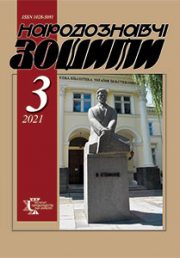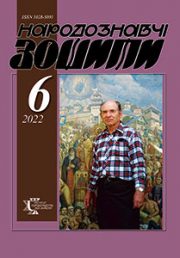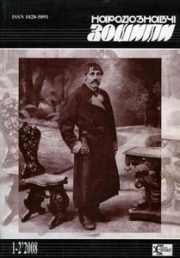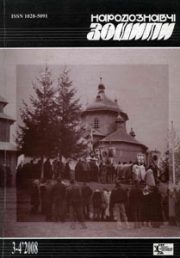The Ethnology Notebooks. 2019, № 4 (148), 850—860
УДК 398.838(=161.2):7.049:177.61]:801.81
DOI https://doi.org/10.15407/nz2019.04.850
FUND OF MOTIVES OF UKRAINIAN FOLK SONGS ABOUT LOVE
HANDZIY Uliana
ORCID ID: https://orcid.org/0000-0002-5382-6821
Postgraduate student of Filaret Kolessa
Department of Ukrainian Folklore Studies,
Ivan Franko National University of Lviv
1, University str., 79000, Lviv, Ukraine
Contacts: e-mail: uliana.piasetska@gmail.com
Abstract. Motive is an important structural plot`s element. Though songs about love belong to lyrics and the plot of them, as you know, is absent but nevertheless motives can be highlighted. The article analyzes and investigates fund of motives of Ukrainian songs about love. The object of the research is the texts of Ukrainian folk songs about love, and the subject is its fund of motives. This will make it possible to outline the ideological and thematic peculiarity of the genre.
The article traces the connections of folk songs about love through related motives with other genres of folk literature. Each motif highlights a certain stage of the relationships between lovers. All singled motives can be systematized by a positive and negative connotation, namely providing publication of sad or fun tonality. To the so-called «positive» author attributes the motives flirtation, charm, «questioning», gifted, bribery/ransom, appeal to heavenly bodies, fate, the judgment of a darling by God. And to those that are «negative», there are motives of material inequality, the erection of the girl, the motive of refusals, conflicts with the parents and the punishment of the girl’s parents, rivalry, fear, betrayal, hindrances for lovers, separation, loss of darling, distressed partner and sacrifice.
It was found out that motives of Ukrainian folk songs about love are found in other Ukrainian folklore genres. For example, the motive of charming is one of the main in the ballad. Gifted is a compulsory element of wedding drama. The motive of «questioning» is recorded in fairy tales as a motive of enchantment riddles. Appeal to heavenly bodies is a cross-cutting motive of all genres of Ukrainian folklore.
There is traced and confirmed the connection between motives of songs about love and moral and ethical characteristics of the Ukrainian nation. In particular, the motive of the judgment of a darling by God denotes to the important role of the Christian faith in the Ukrainian’s people life. The motive of controversy proves a great deal of community thought for lovers.
Consequently, the analysis fund of the motive of love lyrics will allow one to study Ukrainian folk songs about love as a genre and to discover those common points of touch of all folklore genres.
Keywords: Ukrainian folk songs about love, motive, fund of motives of Ukrainian folk songs about love, poetic world, symbol.
Received 15.05.2019
REFERENCES
Maksymovych, M. (1827). Little Russian`s Songs. Mosсоv [in Russian].
Franko, I. (1968). Song about Truth and Lies. Collection of works: in 50-ty volumes (Vol. 43, pp. 280—352). Kyiv [in Ukrainian].
Kuz’menko, O. (2012). Ukrainian social-household songs in Moldova (peculiarities of poetics). Diaspora’s traditional culture: collection of scientific works. (Pp. 242—262). Odesa: Publishing house KP OMD [in Ukrainian].
Sokil, V., & Pavliuk, S. (Eds.). (2007). Small Encyclopedia of Ukrainian Ethnology (Pp. 355—356). Lviv: The Ethnology Institute of National Academy of Sciences of Ukraine [in Ukrainian].
Kyrchiv, R., & Chornopyskyj, M. (Eds.). (2008). Ukrainian folklore studies. Dictionary. Ternopil’: Textbooks and manuals [in Ukrainian].
Dej, O., & Romanets, O. (Eds.). (1968). Folk songs in Bykovuna in the records of Yuriy Fed’kovych. Kyiv: Musical Ukraine [in Ukrainian].
Kostomarov, M., Betko, I., Polotaj, A., & Yatsenko, M. (Eds.). (1994). Slavic mythology. Kyiv: Lybid’ [in Ukrainian].
Kovalenko, V. (2005). Psychology of folklore. Psychological image in Ukrainian folk songs. Educational textbook. Lviv: Publishing house of Ivan Franko National University of Lviv [in Ukrainian].
Dictionary of the Ukrainian language. (1970). (Vol. 1: A—V). Kyiv [in Ukrainian].
Holovats’kyj, Ya. (1878). Folk songs of Halytska and Hungarian Rus (Vol. 1). Moscow [in Russian].







